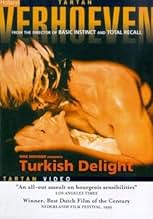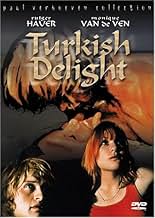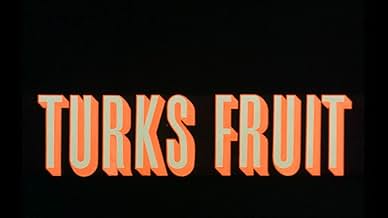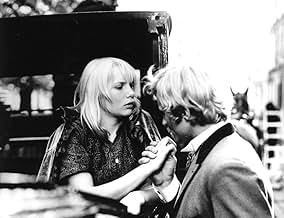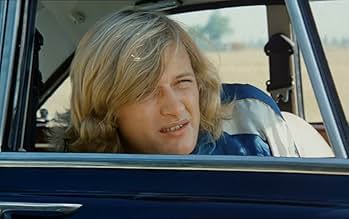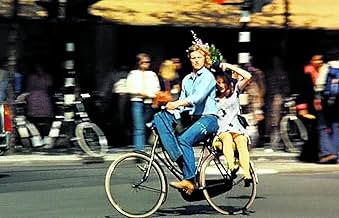VALUTAZIONE IMDb
7,1/10
12.366
LA TUA VALUTAZIONE
Un giovane amore deve lottare contro un vecchio problema.Un giovane amore deve lottare contro un vecchio problema.Un giovane amore deve lottare contro un vecchio problema.
- Regia
- Sceneggiatura
- Star
- Candidato a 1 Oscar
- 1 vittoria e 1 candidatura in totale
Suze Broks
- Eric's One night stand
- (as Suzie Broks)
Recensioni in evidenza
There are many ways in which love and passion can be manifested in a relationship, but if it is to prevail, it is essential that both sides complement one another, physically, emotionally and psychologically; the feelings borne on the wings of romance must above all else be mutual and deeply instilled on both sides. When they are not, the end result must necessarily be estrangement; it is a law-- not of man, but of nature. In `Turkish Delight,' director Paul Verhoeven dissects a relationship born of passion, examines the ramifications of the attitudes and actions of the individuals involved-- as well as the couple they become-- and offers the results to his audience for consideration. Is it, though, a story of love and passion? Yes. But it comes via a route more analogous to the sensibilities of David Cronenberg than Ang Lee; it is decidedly more Craven than Capra. So don't come to this film expecting tender moments; instead, prepare yourself for an offering that is provocative, that is sexually explicit, and finally, graphic in it's more violent moments. This is a film for neither the fainthearted nor the modest, but for the discerning viewer only.
In the first few minutes of this film, we are introduced to Eric Vonk (Rutger Hauer), an artist with a passion for his work, but even more so for experiences that lean more toward the wanton and carnal in aspect. We instantly become voyeurs as he proceeds to overindulge in a series of lusty encounters, an extreme display of irresponsible debauchery that cannot but impel a most unpropitious and subjective first impression on behalf of the viewer, who is forced to bear witness to a man of obvious and insatiable appetites and a tentative moral code. Or so it would seem, initially.
As the story unfolds, however, we begin to understand Eric and what it is that compels him thus; and it begins with a photograph of a beautiful young woman named Olga (Monique van de Ven), the woman with whom Eric once shared his life, love, passion and, yes, his lust. It is obvious from the outset that she is no longer with him, which evokes the question that has to be asked: `Why?' And from that inauspicious beginning, a picture emerges that may not be pretty, and is, in fact, fairly disconcerting. By the end of the film, though, all questions pertaining to Eric Vonk and the mysterious Olga have been answered. The screen grows dark then; but the images to which the viewer has just been made privy are ones that are going to remain in the mind's eye for some time afterwards.
Working from a screenplay by Gerard Soeteman (adapted from the novel by Jan Wolkers), Verhoeven establishes himself as the antithesis of Nora Ephron, presenting his `love' story in terms that are decidedly raw and primitive. Though he does manage to establish the fact that Eric does have deep love for Olga, it is lust that seemingly dominates the picture, and though there is a dramatic twist to the story, it all comes across more like a twisted fairy tale than anything else. Verhoeven uses violence to express the same sentiments Ephron, for example, does through compassion and empathy. But that is his style. It's his prerogative; it's his turf; it's his film. And Verhoeven as much as says to his audience that if you don't like it, you can leave. It's not as if he doesn't have respect for his viewer, though; rather, it seems as if it's something he simply has not considered.
If you can get past the baggage with which Verhoeven inexplicably saddles his own film, there is an interesting, if not riveting, story to be found. But, like Cronenberg's affinity for slime and things that ooze, Verhoeven apparently cannot escape his affinity for violence, even when it works to his detriment. In the case of this film, it results in certain scenes that are too avant-garde to be effective within the context of the overall film. These are scenes in which Eric is hallucinating or day dreaming about particular aspects of his relationship with Olga. They are abrupt insertions into the narrative that simply do not mesh with the flow of the film. The seam left by the weave, as it were, is just too apparent. Beyond the shock value (which is minimum), it just doesn't work.
On the positive side, Verhoeven does extract worthy performances from his stars, Hauer and van de Ven. Hauer, in his feature film debut (and at this point some eight years away from his American film debut in `Nighthawks') displays a natural ability in front of the camera and seems comfortably uninhibited, which enables him to use his rugged good looks to the best advantage. Eric is a complex character of single minded intent, which Hauer conveys quite ably in his performance. Van de Ven also makes her motion picture debut here, and beyond her obvious beauty there is a definite indication of the talent that would soon bring her international acclaim (though her star has yet to rise above the American landscape). Her portrayal of Olga is convincing, and her myriad charms are neither misplaced nor misused by Verhoeven here. And commendably, she manages to transcend the mere use of her physical attributes and create a memorable character with a truly affecting performance.
The supporting cast includes Tonny Huurdeman (Moeder), Wim van den Brink (Vader) and Dolf de Vries (Paul). This film is definitely not for everyone; it fails as entertainment, but succeeds as an examination of the extremes to which we, as humans, are susceptible. `Turkish Delight,' then, will be received in any number of different ways. Some will be shocked and appalled by what they see on the screen; others will be offended. And still others will understand that what is depicted here is a very real reflection of things that go on in a very real world, as interpreted by Paul Verhoeven. 7/10.
In the first few minutes of this film, we are introduced to Eric Vonk (Rutger Hauer), an artist with a passion for his work, but even more so for experiences that lean more toward the wanton and carnal in aspect. We instantly become voyeurs as he proceeds to overindulge in a series of lusty encounters, an extreme display of irresponsible debauchery that cannot but impel a most unpropitious and subjective first impression on behalf of the viewer, who is forced to bear witness to a man of obvious and insatiable appetites and a tentative moral code. Or so it would seem, initially.
As the story unfolds, however, we begin to understand Eric and what it is that compels him thus; and it begins with a photograph of a beautiful young woman named Olga (Monique van de Ven), the woman with whom Eric once shared his life, love, passion and, yes, his lust. It is obvious from the outset that she is no longer with him, which evokes the question that has to be asked: `Why?' And from that inauspicious beginning, a picture emerges that may not be pretty, and is, in fact, fairly disconcerting. By the end of the film, though, all questions pertaining to Eric Vonk and the mysterious Olga have been answered. The screen grows dark then; but the images to which the viewer has just been made privy are ones that are going to remain in the mind's eye for some time afterwards.
Working from a screenplay by Gerard Soeteman (adapted from the novel by Jan Wolkers), Verhoeven establishes himself as the antithesis of Nora Ephron, presenting his `love' story in terms that are decidedly raw and primitive. Though he does manage to establish the fact that Eric does have deep love for Olga, it is lust that seemingly dominates the picture, and though there is a dramatic twist to the story, it all comes across more like a twisted fairy tale than anything else. Verhoeven uses violence to express the same sentiments Ephron, for example, does through compassion and empathy. But that is his style. It's his prerogative; it's his turf; it's his film. And Verhoeven as much as says to his audience that if you don't like it, you can leave. It's not as if he doesn't have respect for his viewer, though; rather, it seems as if it's something he simply has not considered.
If you can get past the baggage with which Verhoeven inexplicably saddles his own film, there is an interesting, if not riveting, story to be found. But, like Cronenberg's affinity for slime and things that ooze, Verhoeven apparently cannot escape his affinity for violence, even when it works to his detriment. In the case of this film, it results in certain scenes that are too avant-garde to be effective within the context of the overall film. These are scenes in which Eric is hallucinating or day dreaming about particular aspects of his relationship with Olga. They are abrupt insertions into the narrative that simply do not mesh with the flow of the film. The seam left by the weave, as it were, is just too apparent. Beyond the shock value (which is minimum), it just doesn't work.
On the positive side, Verhoeven does extract worthy performances from his stars, Hauer and van de Ven. Hauer, in his feature film debut (and at this point some eight years away from his American film debut in `Nighthawks') displays a natural ability in front of the camera and seems comfortably uninhibited, which enables him to use his rugged good looks to the best advantage. Eric is a complex character of single minded intent, which Hauer conveys quite ably in his performance. Van de Ven also makes her motion picture debut here, and beyond her obvious beauty there is a definite indication of the talent that would soon bring her international acclaim (though her star has yet to rise above the American landscape). Her portrayal of Olga is convincing, and her myriad charms are neither misplaced nor misused by Verhoeven here. And commendably, she manages to transcend the mere use of her physical attributes and create a memorable character with a truly affecting performance.
The supporting cast includes Tonny Huurdeman (Moeder), Wim van den Brink (Vader) and Dolf de Vries (Paul). This film is definitely not for everyone; it fails as entertainment, but succeeds as an examination of the extremes to which we, as humans, are susceptible. `Turkish Delight,' then, will be received in any number of different ways. Some will be shocked and appalled by what they see on the screen; others will be offended. And still others will understand that what is depicted here is a very real reflection of things that go on in a very real world, as interpreted by Paul Verhoeven. 7/10.
Turkish delight is a book by the Dutch true artist Jan Wolkers: a painter, a sculptor, a writer. Symbol of sexual liberation in the 60's and 70's with a series of books about his youth, freeing himself of protestant chains and the general revolt against the bourgeoisie, Wolkers made himself big. But he became larger than life with his contribution to Dutch culture and the understanding of the Dutch mind. The movie itself is a delight with scenes shot in Amsterdam and the greater Amsterdam area: all that is fashionable passes by, not just sexual freedom and the confrontation with society. And the beauty of both Rutger Hauer and Monique van der Ven, is a well deserved extra.
This is a very intense movie about love, hate, life and death with a lot of symbolism and realism at the same time. The plot is located in the early 70ies in Amsterdam and features Monique van de Ven and Rutger Hauer who give a really great performance. The supporting actors are also very well chosen and there are no lengthy parts in the story that can make you laugh and cry at the same time.
There are few movies that are able to create an atmosphere that intense. But be warned - this movie polarizes - either you love it or you hate it.
I'll rate it a 9 out of 10.
There are few movies that are able to create an atmosphere that intense. But be warned - this movie polarizes - either you love it or you hate it.
I'll rate it a 9 out of 10.
Slightly before the "frizzling" Frenchmen started their famous Emmanuelle-series, the tardy Dutch had Turkish Delight already available and attracted millions of viewers... Well, they are not directly comparable, but movements and changes in views that began to form in the 1960ies enable to realise such creations for "ordinary" people as well. The film in question is pleasantly moody, showing various angles of love-sex-relationship, and courageous character actors (particularly Monique van de Ven as Olga Stapels, Rutger Hauer as Eric Vonk), skillful directing (Paul Verhoeven) and cinematography (Jan de Bont) provide this not-so-extraordinary script additional values and undertones.
At the same time, I have doubts that Turkish Delight is a timeless film, that it approaches and influences future and current people as well, as many attitudes have changed, and many would consider depicted fashion and hairiness as odd (mildly speaking). And those accustomed to Internet have seen much "bolder" stuff...
At the same time, I have doubts that Turkish Delight is a timeless film, that it approaches and influences future and current people as well, as many attitudes have changed, and many would consider depicted fashion and hairiness as odd (mildly speaking). And those accustomed to Internet have seen much "bolder" stuff...
"Turks Fruit",based on the novel written by the legendary Dutch writer Jan Wolkers,is a true Dutch classic. That doesn't mean that much since my country isn't a major player in World cinema.Yet this film is very good and very famous.
It was voted the best Dutch film ever a few years ago when a national poll was held in Holland.It's tough to agree with that,since I haven't seen all the classics but it's right up there,that much is true.
The sex and dirty images of poo are not for everyone to see,yet it is essential to the free culture of Amsterdam in the 1970's.
Amsterdam was the center of the world in the 70's,so my mother told me. That was probably the reason why she left France (she is French) and came to Amsterdam."Turks Fruit" shows a very poignant picture of the city at that time and the sexual liberation of them days.
The directing by the,at that time,young Paul Verhoeven is splendid and it's no mystery why he left Holland to go to Hollywood.His talents are clear but another reason was that he was misunderstood in Holland so he said himself.
The camera work is great,but that's no surprise since it's done by one of the greatest cameramen Jan de Bont (who became famous in the 90's with his action classics "Speed" and "Twister",especially "Speed" show the superb talents of de Bont when it comes to camera work).
The film also launched the careers of Rutger Hauer and Monique van de Ven. Van de Ven stayed in Holland,playing in some of the best Dutch films and Hauer went to Hollywood and gained cult fame when he starred in "Blade Runner",a terrific performance by Hauer.
Verhoeven and Hauer would team up again 4 years later to make the Dutch war classic "Soldaat van Oranje".
"Turks Fruit" is truly the epitome of 70's Dutch cinema with it's liberated sex approach that would echo in several other Dutch films in the 70's and 80's.
Very important for Holland but maybe too much for the rest of the world,especially for the rather prudish Hollywood.
Essential viewing though for everyone who wants to know something about the Dutch cinema. 8/10
It was voted the best Dutch film ever a few years ago when a national poll was held in Holland.It's tough to agree with that,since I haven't seen all the classics but it's right up there,that much is true.
The sex and dirty images of poo are not for everyone to see,yet it is essential to the free culture of Amsterdam in the 1970's.
Amsterdam was the center of the world in the 70's,so my mother told me. That was probably the reason why she left France (she is French) and came to Amsterdam."Turks Fruit" shows a very poignant picture of the city at that time and the sexual liberation of them days.
The directing by the,at that time,young Paul Verhoeven is splendid and it's no mystery why he left Holland to go to Hollywood.His talents are clear but another reason was that he was misunderstood in Holland so he said himself.
The camera work is great,but that's no surprise since it's done by one of the greatest cameramen Jan de Bont (who became famous in the 90's with his action classics "Speed" and "Twister",especially "Speed" show the superb talents of de Bont when it comes to camera work).
The film also launched the careers of Rutger Hauer and Monique van de Ven. Van de Ven stayed in Holland,playing in some of the best Dutch films and Hauer went to Hollywood and gained cult fame when he starred in "Blade Runner",a terrific performance by Hauer.
Verhoeven and Hauer would team up again 4 years later to make the Dutch war classic "Soldaat van Oranje".
"Turks Fruit" is truly the epitome of 70's Dutch cinema with it's liberated sex approach that would echo in several other Dutch films in the 70's and 80's.
Very important for Holland but maybe too much for the rest of the world,especially for the rather prudish Hollywood.
Essential viewing though for everyone who wants to know something about the Dutch cinema. 8/10
Lo sapevi?
- QuizIn 1973, this was the most successful Dutch movie ever, and with 3.3 million tickets sold, it was still the most attended Dutch movie in The Netherlands during its 50-year anniversary in 2023.
- BlooperDuring the thunderstorm, when Eric is walking towards Olga who is standing outside in the rain, the reflection of a spotlight providing "lightning" can be seen on the surface of the door.
- ConnessioniFeatured in Adam & Yves (1974)
- Colonne sonoreMeisjes met rode haren
(uncredited)
Written by Manfred Oberdörffer (uncredited) & Hans Georg Moslener (uncredited)
Dutch lyrics by Pim van Zijl (uncredited)
Performed by Arne Jansen (uncredited)
I più visti
Accedi per valutare e creare un elenco di titoli salvati per ottenere consigli personalizzati
- How long is Turkish Delight?Powered by Alexa
Dettagli
- Data di uscita
- Paese di origine
- Lingue
- Celebre anche come
- Turkish Delight
- Luoghi delle riprese
- Azienda produttrice
- Vedi altri crediti dell’azienda su IMDbPro
Botteghino
- Budget
- 800.000 NLG (previsto)
Contribuisci a questa pagina
Suggerisci una modifica o aggiungi i contenuti mancanti

Divario superiore
By what name was Fiore di carne (1973) officially released in India in English?
Rispondi
